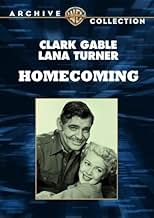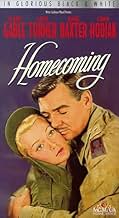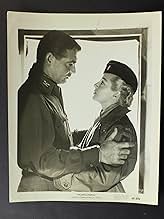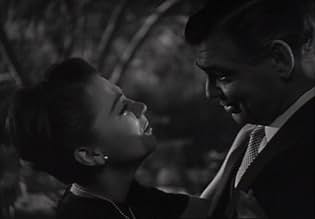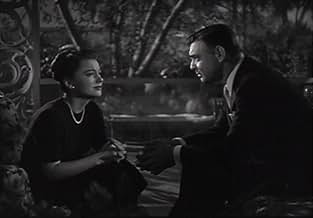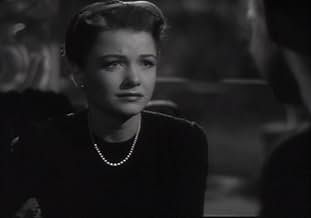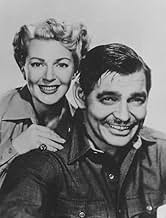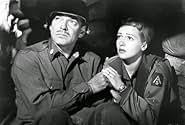IMDb रेटिंग
6.8/10
1.2 हज़ार
आपकी रेटिंग
अपनी भाषा में प्लॉट जोड़ेंAt the end of WW2, aboard a repatriation ship, an Army doctor reminisces about his war years while being interviewed by a reporter.At the end of WW2, aboard a repatriation ship, an Army doctor reminisces about his war years while being interviewed by a reporter.At the end of WW2, aboard a repatriation ship, an Army doctor reminisces about his war years while being interviewed by a reporter.
- पुरस्कार
- कुल 4 जीत
John Albright
- Corpsman
- (बिना क्रेडिट के)
Frank Arnold
- Maitre d'Hotel
- (बिना क्रेडिट के)
Peggy Badley
- Nurse Betty Simpson
- (बिना क्रेडिट के)
Art Baker
- Williams, Reporter on Transport Ship
- (बिना क्रेडिट के)
Gregg Barton
- Captain
- (बिना क्रेडिट के)
Nanette Bordeaux
- Nurse
- (बिना क्रेडिट के)
फ़ीचर्ड समीक्षाएं
Clark Gable, Lana Turner, Anne Baxter, John Hodiak, and Gladys Cooper star in "Homecoming," a 1948 film about wartime and its aftermath.
Gable plays a surgeon, Lee, who falls for a nurse (Turner) with whom he puts together the wounded, endures a life with only the barest of necessities, sits in shelters, and dodges. Back home, his devoted wife (Baxter) realizes by reading his letters that she's losing him.
World War II has been romanticized often in films and in music - somehow, it is perceived by people who lived through Vietnam, Desert Storm, and our current conflicts as being somehow a cleaner war. But no war is clean, and there were some homecomings that were difficult as well. This was touched upon in "The Best Years of Our Lives," and very well here.
The story is brought to life by its players. The role of Snapshot the nurse is a different one for the glamorous and beautiful Turner than what she was normally handed - the curse of the beautiful in Hollywood. She was capable of much more, and she gives a strong performance as an outspoken soldier who finally lets her vulnerability show.
The stalwart Gable gives us a man who realizes the detached attitude he had toward his patients at home will no longer work, and he has to rethink himself and his life.
Baxter is the "one left out," who can't experience the war, and she gives an excellent portrayal of a woman who loves her husband but doesn't know what to expect from him when he comes home. "I know he's changed," she laments, "but why couldn't we have changed together?"
Her real-life husband, John Hodiak, looks quite handsome but doesn't have much to do as a family friend - his brief brush with stardom was a few years away.
A very nice movie that shows that homecoming can be uncomfortable and bittersweet.
Gable plays a surgeon, Lee, who falls for a nurse (Turner) with whom he puts together the wounded, endures a life with only the barest of necessities, sits in shelters, and dodges. Back home, his devoted wife (Baxter) realizes by reading his letters that she's losing him.
World War II has been romanticized often in films and in music - somehow, it is perceived by people who lived through Vietnam, Desert Storm, and our current conflicts as being somehow a cleaner war. But no war is clean, and there were some homecomings that were difficult as well. This was touched upon in "The Best Years of Our Lives," and very well here.
The story is brought to life by its players. The role of Snapshot the nurse is a different one for the glamorous and beautiful Turner than what she was normally handed - the curse of the beautiful in Hollywood. She was capable of much more, and she gives a strong performance as an outspoken soldier who finally lets her vulnerability show.
The stalwart Gable gives us a man who realizes the detached attitude he had toward his patients at home will no longer work, and he has to rethink himself and his life.
Baxter is the "one left out," who can't experience the war, and she gives an excellent portrayal of a woman who loves her husband but doesn't know what to expect from him when he comes home. "I know he's changed," she laments, "but why couldn't we have changed together?"
Her real-life husband, John Hodiak, looks quite handsome but doesn't have much to do as a family friend - his brief brush with stardom was a few years away.
A very nice movie that shows that homecoming can be uncomfortable and bittersweet.
This is a far from perfect film featuring Gable and Turner, but upon seeing it for the second time, it sure seemed a lot better than I remembered it. In particular, I appreciated that the film took a pretty big risk dealing with wartime romance between a married doctor and a nurse when they are stationed overseas. This sort of situation MUST have happened quite a bit with all those nurses and WACS/WAVS, etc. serving in action, though it is hardly ever mentioned in any film up until that time. Plus, it offered a very unusual situation where a man is in love with a woman he is not married to and yet he still loves his wife at home. Pretty adult fare for 1948, I must say! The film begins with Gable a rich and successful doctor in the States. He is very isolated from the real world and his main focus in on the country club and his pampered wife--unconcerned about much else. When the war comes, he does serve but seems to be pretty selfish. His head nurse in the field hospital is a much more giving and selfless individual and they are destined to hate each other because they are so different AND because this IS Lana Turner and Clark Gable (this plot device is necessary before they actually fall in love--a bit of a cliché, I know).
Gable and Turner are both excellent as the leads and their scenes together are excellent as well. I especially appreciated Lana's emotional range--it was better and more vulnerable here than I am used to seeing. The direction was pretty good and all the MGM production values were going full speed ahead! I especially appreciated the snow scene--you KNOW it was done in a sound stage and yet it STILL looked exceptional (though their breath didn't show--considering it was probably close to 70 degrees).
Overall, this is a must-see for Gable fans and a pretty good flick for anyone but people who MUST have a lot of action in their films. Despite being WWII, the film is pretty talking and there is quite a bit of romance--something action junkies will probably have a hard time accepting.
Gable and Turner are both excellent as the leads and their scenes together are excellent as well. I especially appreciated Lana's emotional range--it was better and more vulnerable here than I am used to seeing. The direction was pretty good and all the MGM production values were going full speed ahead! I especially appreciated the snow scene--you KNOW it was done in a sound stage and yet it STILL looked exceptional (though their breath didn't show--considering it was probably close to 70 degrees).
Overall, this is a must-see for Gable fans and a pretty good flick for anyone but people who MUST have a lot of action in their films. Despite being WWII, the film is pretty talking and there is quite a bit of romance--something action junkies will probably have a hard time accepting.
Sometimes I don't understand those who judge the quality of a film, because this one deserves more credits. With classic cinema it happens as when one reads past history, you must place yourself in the historical moment, to better understand the reason for the events and the behavior of its protagonists.
The subject of this film must have happened many times in the years of World War II, as was a fact mentioned by the heirs of those who lived through it, the plot of the 1970 film Sunflower. In the solitude of the battlefield, many Military doctors must have fallen in love with their beautiful nurse on duty.
The scene where Lana Turner and Grant kiss for the first time is unforgettably beautiful. The initial attitude between the two as military leaders is perfect. So is officer Useless's erratic behavior when he returns from the war to his wife, and his longing for home, everything seems strange to him. I believe that there was no American soldier who did not suffer this crisis upon returning from the battlefield, after several years of fighting.
The final dialogue between the misplaced officer and his wife is like a parody of what many of those American heroes lived through.
It is true that it is not easy for young people today to watch Black and White films from the classic cinema, I advise them to try to locate themselves in time, and try to understand at the same time the limitations of the technology of that time. They will realize if they achieve it, that cinematographic art prevailed here.
The subject of this film must have happened many times in the years of World War II, as was a fact mentioned by the heirs of those who lived through it, the plot of the 1970 film Sunflower. In the solitude of the battlefield, many Military doctors must have fallen in love with their beautiful nurse on duty.
The scene where Lana Turner and Grant kiss for the first time is unforgettably beautiful. The initial attitude between the two as military leaders is perfect. So is officer Useless's erratic behavior when he returns from the war to his wife, and his longing for home, everything seems strange to him. I believe that there was no American soldier who did not suffer this crisis upon returning from the battlefield, after several years of fighting.
The final dialogue between the misplaced officer and his wife is like a parody of what many of those American heroes lived through.
It is true that it is not easy for young people today to watch Black and White films from the classic cinema, I advise them to try to locate themselves in time, and try to understand at the same time the limitations of the technology of that time. They will realize if they achieve it, that cinematographic art prevailed here.
Movies like this one are discoveries. Mervyn LeRoy was a director that always knew where to go for a good story and get amazing performances out of his actors. In this film he demonstrates how to create a movie that holds the viewer's attention. It is based on a story by Sidney Kingsley and was adapted by Jan Lustig.
The movie shows the American cinema at its best as it combines a look to WWII and a forbidden love, something that probably had a hard time passing the censor's scissors. Mr. LeRoy makes the picture highly engrossing because of the way he presents the story. Men and women, for the first time were in the front lines; the men as combatants, or in this case, a doctor and the women as nurses, or filling in for the jobs the men couldn't do because they did the fighting.
Clark Gable was an actor that made this picture the joy it is to watch by making us believe he is this surgeon, Dr. Lee Johnson, a man that awakes to reality when he has to deal first hand with treating the wounded soldiers. Mr. Gable casts such a virile shadow in his best work that we know where he stood all the time. His Dr. Johnson shows the strain of the stress of war, the loyalty to his wife at home and the sudden love he finds for "Snapshot" McCall. He remains throughout the film focused in helping the soldiers, until the passion he feels for his nurse, gets the best of him.
Lana Turner is the real surprise of the movie. She is playing a role that probably would not have been offered to her because of the heat and glamour she projected. Her nurse McCall is a woman that life has made a cynic because of the tragedy in her own life and the fact that she is separated from her young son. The magnetism between Ms. Turner and Mr. Gable is what keeps us interested in the movie. Lana Turner shows she had the potential for playing dramatic parts that were not offered to her; she was type-casted as the siren, or the sophisticate in most of her work, but she had the range and the potential that probably only Mr. LeRoy, who discovered Ms. Turner, saw she had. Only a director like Mr. LeRoy could elicit this performance from Ms. Turner.
Anne Baxter is the wife that stays home hoping her man will come back alive. Her Penny Johnson makes her appear as insecure because she perceives her husband's affection might lie with the nurse that he complains to her at the beginning of his correspondence. John Hodiak plays the friend, Dr. Sunday, a man who has his feet on the ground and believes he should help the poor people of his area, instead of the society types that Dr. Johnson attracts.
The movie is satisfying because is tells a good story with characters one is easily identified with. Mr. LeRoy was the one that got all the elements together and gave us this classic film that is timeless.
The movie shows the American cinema at its best as it combines a look to WWII and a forbidden love, something that probably had a hard time passing the censor's scissors. Mr. LeRoy makes the picture highly engrossing because of the way he presents the story. Men and women, for the first time were in the front lines; the men as combatants, or in this case, a doctor and the women as nurses, or filling in for the jobs the men couldn't do because they did the fighting.
Clark Gable was an actor that made this picture the joy it is to watch by making us believe he is this surgeon, Dr. Lee Johnson, a man that awakes to reality when he has to deal first hand with treating the wounded soldiers. Mr. Gable casts such a virile shadow in his best work that we know where he stood all the time. His Dr. Johnson shows the strain of the stress of war, the loyalty to his wife at home and the sudden love he finds for "Snapshot" McCall. He remains throughout the film focused in helping the soldiers, until the passion he feels for his nurse, gets the best of him.
Lana Turner is the real surprise of the movie. She is playing a role that probably would not have been offered to her because of the heat and glamour she projected. Her nurse McCall is a woman that life has made a cynic because of the tragedy in her own life and the fact that she is separated from her young son. The magnetism between Ms. Turner and Mr. Gable is what keeps us interested in the movie. Lana Turner shows she had the potential for playing dramatic parts that were not offered to her; she was type-casted as the siren, or the sophisticate in most of her work, but she had the range and the potential that probably only Mr. LeRoy, who discovered Ms. Turner, saw she had. Only a director like Mr. LeRoy could elicit this performance from Ms. Turner.
Anne Baxter is the wife that stays home hoping her man will come back alive. Her Penny Johnson makes her appear as insecure because she perceives her husband's affection might lie with the nurse that he complains to her at the beginning of his correspondence. John Hodiak plays the friend, Dr. Sunday, a man who has his feet on the ground and believes he should help the poor people of his area, instead of the society types that Dr. Johnson attracts.
The movie is satisfying because is tells a good story with characters one is easily identified with. Mr. LeRoy was the one that got all the elements together and gave us this classic film that is timeless.
2nd viewing and a lot of time in between.
Enjoyed it first time especially how Lana pulls her role off and how sincere Gable was. Both great actors always worth watching. Anne Baxter was also very,very touching and deep as the wife.
What really got me this time, having spent war time in Nam, was the changes Gable went through and the HOMECOMING. Anyone who has NOT experienced the razor's edge of actual combat, the terror the elation and the horror of seeing others die can feel what Gable projected magnificently in coming home after all that madness and trying to feel like you fit in again anywhere. You don't....for a long time. That why Gable said "...bear with me for a while..." Not only was he talking about losing Lana but returning home from a war, sometimes much more difficult than war itself. This film has so much deep feelings embedded in all three major characters it is amazing to me. The writer nailed it and Mr LeRoy was almost genius in bringing out such performances by all. I'm glad I got to view it on TCM a 2nd time. It really brings out a HOMECOMING!!
Enjoyed it first time especially how Lana pulls her role off and how sincere Gable was. Both great actors always worth watching. Anne Baxter was also very,very touching and deep as the wife.
What really got me this time, having spent war time in Nam, was the changes Gable went through and the HOMECOMING. Anyone who has NOT experienced the razor's edge of actual combat, the terror the elation and the horror of seeing others die can feel what Gable projected magnificently in coming home after all that madness and trying to feel like you fit in again anywhere. You don't....for a long time. That why Gable said "...bear with me for a while..." Not only was he talking about losing Lana but returning home from a war, sometimes much more difficult than war itself. This film has so much deep feelings embedded in all three major characters it is amazing to me. The writer nailed it and Mr LeRoy was almost genius in bringing out such performances by all. I'm glad I got to view it on TCM a 2nd time. It really brings out a HOMECOMING!!
क्या आपको पता है
- ट्रिवियाAccording to the AFI catalog entry for this film, for the battle scenes in Italy, MGM constructed five 35-foot towers, a full-sized evacuation hospital, and more than 100 Army tents at the Lasky-Mesa movie ranch 35 miles outside of Hollywood. The set took three weeks to build and the scenes used hundreds of extras, five cameras, and six assistant directors. This was all for a re-creation of the historic capture of the Anzio beachhead in Italy by U.S. and British forces on January 22, 1944.
- गूफ़At the end, Penny Johnson says she followed her husband's movements on a map. During World War II, people in the military had it drilled into them that they could not say anything about where they were in letters sent back home, and to make sure they kept that rule, the mail from soldiers was censored. This has been mentioned in numerous histories of World War II. With Clark Gable being an officer, it's even less likely any information about his movements around Europe would have been available to his wife.
- कनेक्शनEdited from Waterloo Bridge (1940)
टॉप पसंद
रेटिंग देने के लिए साइन-इन करें और वैयक्तिकृत सुझावों के लिए वॉचलिस्ट करें
विवरण
- रिलीज़ की तारीख़
- कंट्री ऑफ़ ओरिजिन
- भाषा
- इस रूप में भी जाना जाता है
- Renunciación
- फ़िल्माने की जगहें
- उत्पादन कंपनी
- IMDbPro पर और कंपनी क्रेडिट देखें
बॉक्स ऑफ़िस
- बजट
- $26,54,000(अनुमानित)
- चलने की अवधि
- 1 घं 53 मि(113 min)
- रंग
- पक्ष अनुपात
- 1.37 : 1
इस पेज में योगदान दें
किसी बदलाव का सुझाव दें या अनुपलब्ध कॉन्टेंट जोड़ें


